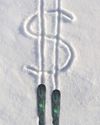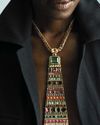
Winston Churchill sensed what was coming. As a young soldier in India in the closing years of the 19th century, he drafted an essay on the world he hoped to enter: that of politics and public service. Long unpublished, Churchill's piece, titled "The Scaffolding of Rhetoric, explored a perennial question: What makes a good speech? "Of all the talents bestowed upon men, none is so precious as the gift of oratory, Churchill wrote. "He who enjoys it wields a power more durable than that of a great king. He is an independent force in the world. Abandoned by his party, betrayed by his friends, stripped of his offices, whoever can command this power is still formidable... A meeting of grave citizens...is unable to resist its influence?"
And yet to Churchill the art form seemed at risk. Writing in 1897 amid an era shaped by rapid communication-the telegraph was the internet of the day he believed the orator's capacity to move audiences was more circumscribed than in ages past. "The newspaper report and the growing knowledge of men have, it is said, led to the decline of rhetoric, Churchill observed. "Now no rhetorician would be likely to admit that his art had lost its power, and if this proposition be generally affirmed, the conclusion follows that there are at present no orators."
This story is from the {{IssueName}} edition of {{MagazineName}}.
Start your 7-day Magzter GOLD free trial to access thousands of curated premium stories, and 9,000+ magazines and newspapers.
Already a subscriber ? Sign In
This story is from the {{IssueName}} edition of {{MagazineName}}.
Start your 7-day Magzter GOLD free trial to access thousands of curated premium stories, and 9,000+ magazines and newspapers.
Already a subscriber? Sign In

Wake Up and Smell the PALM TREES
In Palm Beach, second homes are the new first homes. For Tommy Hilfiger, Coral House is much more. After 40 years of running a fashion empire, he's shifting gears and staying put for a while.

Bite Me!
Perfumes with sweet notes of vanilla, cocoa, caramel, and honey are a guilt-free indulgence. Join us in the dining room, won't you?

Battle for the Soul of SKIING
Lift lines are interminable and slopes are packed. Meanwhile, wealthy resort owners have been making their mountains semi- or entirely private. Can the original gonzo-glamorous sport survive its new highs and lows?

Kingdom Come
Kelly Reilly has become a sensation for her turn as Yellowstone's Beth Dutton, the deliciously wicked daughter of a Montana cattle baron. Now, as the family saga reaches its dramatic finale, the actress is ready to shed her alter ego. Or is she?

Town? Country? YES.
A new Charleston hotel makes it plain: This place is made for traveling, happily between worlds.

Escape from the WHITE BOX GALLERY
Art collectors, stifle your yawns and

Escape to WHERE TOURMALINES SPEAK LOUDER
Desperate to mute quiet luxury?

Escape WORTH AVENUE
Can't stomach yet another lunch at BiCE?

Escape to THE MIND OF ELSA
Are you over every influencer wearing, the same uninspired trinkets?

Escape to SOMEWHERE OVER THE RAINBOW
Are you ready for lapels featuring something other than political posturing?